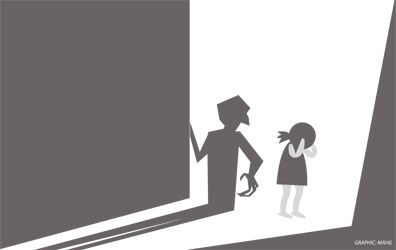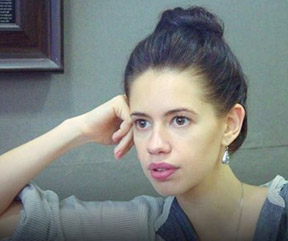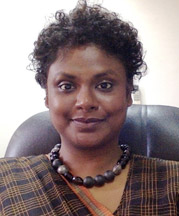Seriously!
It is action, not platitude that’s needed to stop the
scourge of sexual violence against children:
by Anuradha Kodagoda
 The horrific rape and murder of a schoolgirl in Jaffna recently has
once again raised alarm about the brutal sexual violence that women and
children in Sri Lanka face on a regular basis. Statistics show that in
May, seven cases of sexual related crimes against children were reported
in the Jaffna district alone. It is difficult to categorize whether this
is due to a rising trend of violence against children in the country or
whether it is that such incidents are being reported more in the media
than before. The horrific rape and murder of a schoolgirl in Jaffna recently has
once again raised alarm about the brutal sexual violence that women and
children in Sri Lanka face on a regular basis. Statistics show that in
May, seven cases of sexual related crimes against children were reported
in the Jaffna district alone. It is difficult to categorize whether this
is due to a rising trend of violence against children in the country or
whether it is that such incidents are being reported more in the media
than before.
According to experts, this kind of cruelty could exist in a post war
situation, where society had been exposed to a high level of violence,
such as in the North and East, followed by the resultant failure of the
social structure and rehabilitation process to overcome 30 years of war
trauma.
Although there were sufficient child protection laws implemented and
amended during the past few decades, as well as the Penal Code amendment
No 16 of 2006, which strongly urged a minimum of 10 years imprisonment
as punishment for those convicted in child abuse cases, the awareness of
these laws among society is comparatively low vis-à-vis the rest of the
world. In this context the blame falls squarely on the victim while
overall as a society the issue has not been looked at seriously.
Recommendations
Recently the National Child Protection Authority (NCPA) set up a
committee of inquiry to monitor the State’s response and make
recommendations on how such issues can be improved, especially with
regard to the rape and murder of 18-year-old Vindhya Sivaloganathan’s
case and also several other unfortunate incidents of sexual violence
against children that occurred in the North and the East.
Kalki Koechlin speaks on child sexual abuse and exploring
love
|
Kalki Koechlin speaks on child sexual abuse and exploring love
|

Kalki Koechlin |
| “The reason I spoke out about my sexual abuse is not to get people
to feel sorry for me but to give others who have had similar
circumstances the confidence to talk about it. I allowed someone to have
sex with me at the age of nine, not understanding fully what it meant
and my biggest fear after was that my mother would find out. I felt it
was my mistake and so I kept it hidden for years. If I had had the
confidence or awareness to confide in my parents it would have saved me
years of complexes about my own sexuality. It’s important that parents
remove the taboo around the word sex or private parts so kids can speak
openly and be saved from potential abuse.
I believe in being myself every step of the way and not hiding my
true self from society, whether that means getting a divorce because me
and my husband didn’t want to pretend for other people, or wearing
shorts because it’s a hot day or choosing a career which is unstable but
creatively satisfying, or admitting to my weaknesses because learning
from them has led to my strengths.I’ve also been asked a lot about love
lately. Well, i just feel love is not up for public display. Love is not
the pictures you put up on social media. Love is not a certificate of
marriage. Love is not property, children, family or ownership and love
is not a barter - ‘I’ll give you this, if you give me that.’
Love is giving without expecting in return.
It sounds like the ultimate act of self sacrifice right? But the
trouble with giving, and I mean happily and limitlessly giving without
expecting in return, is that one has to be self sufficient, and full of
love for oneself. So, in a way, I believe love is selfish, because only
a person who loves themselves fully, can give fully without expecting,
without needing, without dependency. I’m not there yet, but I fight to
be myself everyday in a world where we are constantly pressurised to be
someone else, and that daily fight is my pursuit for love.”
- Via Humans of Bombay |
Chairperson, National Child Protection Authority (NCPA) Natasha
Balendra explaining the progress for a secured society for the children
of the country, and future plans of the NCPA said, “The National Child
Protection Authority’s mandate focuses primarily on two things, such as;
advising the government on legal and policy reform in relation to child
abuse and monitoring the implementation of such laws and policies and
monitoring the activities of all government institutions involved in the
investigation of child abuse cases. We have been monitoring the
investigation into this rape and murder from the beginning, and we will
continue to monitor.
 |
|
NCPA Chairperson Natasha
Balendra |
“What we have seen is that it is not sufficient for justice to
ultimately be done. It is as important for justice to be seen to be
done.
“If the public are to trust that the State will do the right thing
and bring the perpetrators of a crime to justice, not only do all
government actors have to act effectively and follow correct procedures
but they have to act sensitively and in empathy with the community. In
the past two months the NCPA has been involved in discussions with
stakeholders in the North and East and will shortly be making several
policy proposals to the Government for changes to be implemented, with a
view to a more cohesive, effective, and sensitive response to the sexual
and other violence against children that has become endemic here.”
Fronts
As she explained, the NCPA is working on several fronts to prevent
and respond to child abuse throughout Sri Lanka. Recently it proposed to
the IGP to set up a separate Children and Women’s Division under a
senior DIG, with a specialist cadre with specialized training and
sensitivity to issues confronting women and children.
NCPA is also working with the Attorney General’s Department, the
Police, and the Ministry of Justice on a pilot project to expedite all
cases of child abuse in the Western province. Further, they are working
with doctors, the Ministry of Health, Probation and Child Care Services,
and the Police on a multi-sectoral approach to protect victims of child
abuse to ensure that the criminal justice, medical, and psychosocial
responses to child abuse cases are coordinated in a way that the child
victim receives a holistic response.
Furthermore, 400 officials of NCPA are working island-wide with
families, schools, and communities to raise awareness and to create
self-monitoring and empowerment mechanisms to ensure these instances of
abuse do not occur in the first place.
As Balendra explained, although the laws in the book are quite strong
on child abuse and sexual violence in the country, the problem occurs
when it comes to implementation and enforcement of these laws. There are
problems in the lack of resources of the police, Attorney General’s
office and also at the courts and these lapses create huge delays in the
process. On the other hand, more often judges are hesitating to give at
least the minimum punishment, because in our society, violence against
children and women has never been taken seriously. She also stressed the
importance of reforming the laws of protecting the victims of sexual
abuse.
Violence
“The situation that has prevailed with regard to sexual violence
against women and children in this country is clearly unacceptable. It
has to change. It is the responsibility of all the relevant government
institutions, the NCPA included, to work in cohesion to ensure that this
changes; that Sri Lanka has in place a system for preventing sexual
violence against women and children for responding to such violence in
an effective, prompt, sensitive, and holistic manner.
And members of the public have the right, and indeed the
responsibility, not to take the law into their own hands, but to
lawfully agitate for legal, policy, and social change in this regard, to
monitor the activities of government institutions and agents and call
them out when they act improperly, to monitor and educate their own
communities and to be watchful of their own attitudes and actions,”
Balendra said.
The NCPA recently appointed a Task Force to combat the growing threat
to children and young persons posed by bullying and sexual harassment
via social media sites such as Facebook and Instagram and messaging and
other mobile and web-based applications such as SnapChat and WhatsApp.
The task force comprises members from the NCPA, the Attorney General’s
Department, the Police Department, the Ministry of Justice, and the NGO
community. The Task Force will immediately start taking action to
investigate and prosecute to the full extent of the law those using the
internet or mobile devices for purposes of bullying, harassing,
stalking, or extortion of children and young persons.
The NCPA is concurrently working with the Ministry of Education, the
Ministry of Justice, Sri Lanka CERT, ICDL Sri Lanka, the Department of
Police, several private sector organizations, NGOs and INGOs to develop
a module for use in schools on the safe use of the internet with a
special focus on cyber bullying and other cyber crimes.
The module will be piloted in a number of schools in the Colombo
District and thereafter distributed throughout the country.
Failure
Speaking on the root cause for this rising trend in child abuse in
the country, the NCPA Chairman admitted that there hasn’t been
sufficient research done in understanding the root cause. “Actually it
is a one big failure of our system compared with other part of the world
because it shows the lack of understanding and attention from the
respective authorities.
However, we are in the middle of discussing about commissioning a
research next year to find out the root cause of child abuse in Sri
Lanka and we hope it will give more light in terms of understanding and
preventing child abuse in Sri Lanka,” she said. |

